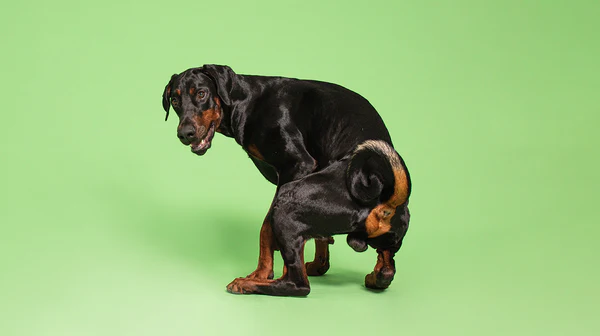Constipation in dogs can be uncomfortable and even painful. If your dog is struggling to poop, it’s important to help them find relief quickly. In this article, we’ll cover common causes of constipation, signs to watch for, and safe ways to encourage your dog to have a bowel movement.
Signs of Constipation in Dogs
Before trying to treat your dog’s constipation, it’s important to confirm whether they are actually constipated. Some common signs include:
- Straining or Difficulty Pooping: Your dog may try to poop but produce little to no stool, or only pass small, hard pieces.
- Infrequent Bowel Movements: Dogs should generally poop at least once a day. If it has been more than 48 hours without a bowel movement, they may be constipated.
- Pain or Discomfort: Your dog may appear uncomfortable, whining or pacing, and may hunch their back or show reluctance to walk.
- Dry or Hard Stool: If your dog passes stool, it may be hard, dry, or resemble small pellets.
- Decreased Appetite: A constipated dog may lose interest in food or water.
Common Causes of Constipation in Dogs
Understanding the underlying cause of constipation can help you choose the most effective remedy. Some common causes include:
- Dehydration: Lack of water can lead to dry, hard stools.
- Lack of Fiber: A diet low in fiber can slow down digestion and cause constipation.
- Inactivity: Dogs that don’t get enough exercise may have slower digestion.
- Ingesting Foreign Objects: Eating non-food items, such as bones or hair, can cause blockages in the intestines.
- Medical Conditions: Conditions such as anal gland issues, enlarged prostate, or certain medications can lead to constipation.
Safe and Effective Ways to Help a Constipated Dog Poop Quickly
If your dog is constipated and you need to help them poop quickly, there are several safe and natural methods you can try. Be sure to consult your veterinarian before trying any home remedies, especially if your dog has underlying health issues.
1. Increase Water Intake
Dehydration is one of the most common causes of constipation. Encourage your dog to drink more water to help soften their stool and stimulate bowel movements. You can try:
- Adding water or low-sodium broth to their food.
- Providing ice cubes for your dog to lick.
- Ensuring their water bowl is always full of fresh, clean water.
2. Add Fiber to Their Diet
Fiber helps regulate digestion and can relieve constipation. Consider adding one of the following to your dog's food:
- Canned Pumpkin: Pure canned pumpkin (not the spiced kind) is rich in fiber and can help with both constipation and diarrhea. A tablespoon for small dogs or a few tablespoons for larger dogs should suffice.
- Plain Canned Green Beans: Green beans are a great source of fiber and can be added to your dog’s regular meals.
- Psyllium Husk (Metamucil): Psyllium husk is a fiber supplement that can help with constipation. Consult your vet for the proper dosage for your dog's size.
3. Exercise
Physical activity helps stimulate your dog’s digestive system. Taking your dog for a brisk walk or playing with them can encourage bowel movements. A short but active session of play can sometimes do the trick.
4. Olive Oil or Coconut Oil
A small amount of oil can help lubricate the intestines and ease bowel movements. You can mix 1/2 to 1 teaspoon of olive oil or coconut oil into your dog's food. Avoid overuse, as too much oil can cause diarrhea.
5. Stool Softeners or Laxatives
For more stubborn cases of constipation, your vet may recommend a stool softener or laxative formulated for dogs. Miralax (polyethylene glycol) is sometimes used in small amounts to relieve constipation, but it should only be given under the guidance of a veterinarian.
6. Massage Your Dog’s Abdomen
Gently massaging your dog’s abdomen in a circular motion may help stimulate the intestines and encourage bowel movements. Be gentle and avoid applying too much pressure, as this could cause discomfort.
7. Ensure Adequate Fiber in Their Regular Diet
In the long term, feeding your dog a high-quality, fiber-rich diet can help prevent constipation. Talk to your vet about whether your dog’s diet has enough fiber or if a specialized dog food for digestive health is needed.
When to See a Vet
Most cases of mild constipation can be resolved at home with these remedies, but there are situations where you should seek veterinary care:
- Constipation Lasting More Than 48 Hours: If your dog has not had a bowel movement in more than two days, or if they seem to be in pain or distress, it’s time to consult your vet.
- Blood in Stool or Vomiting: These can be signs of a more serious issue, such as an intestinal blockage or injury.
- Lethargy or Weakness: If your dog is acting unusually tired or weak in addition to being constipated, this could indicate an underlying health issue that requires medical attention.
- Frequent Constipation: If constipation is a recurring issue, your vet may need to evaluate your dog for underlying conditions like dehydration, metabolic disorders, or gastrointestinal issues.
Conclusion
While constipation in dogs is usually not a serious problem, it’s important to address it quickly to prevent discomfort and more severe complications. By increasing your dog’s water intake, adding fiber to their diet, providing regular exercise, and using natural remedies like pumpkin or olive oil, you can often help your dog find relief. If constipation persists or is accompanied by other concerning symptoms, be sure to consult your veterinarian for proper diagnosis and treatment.


